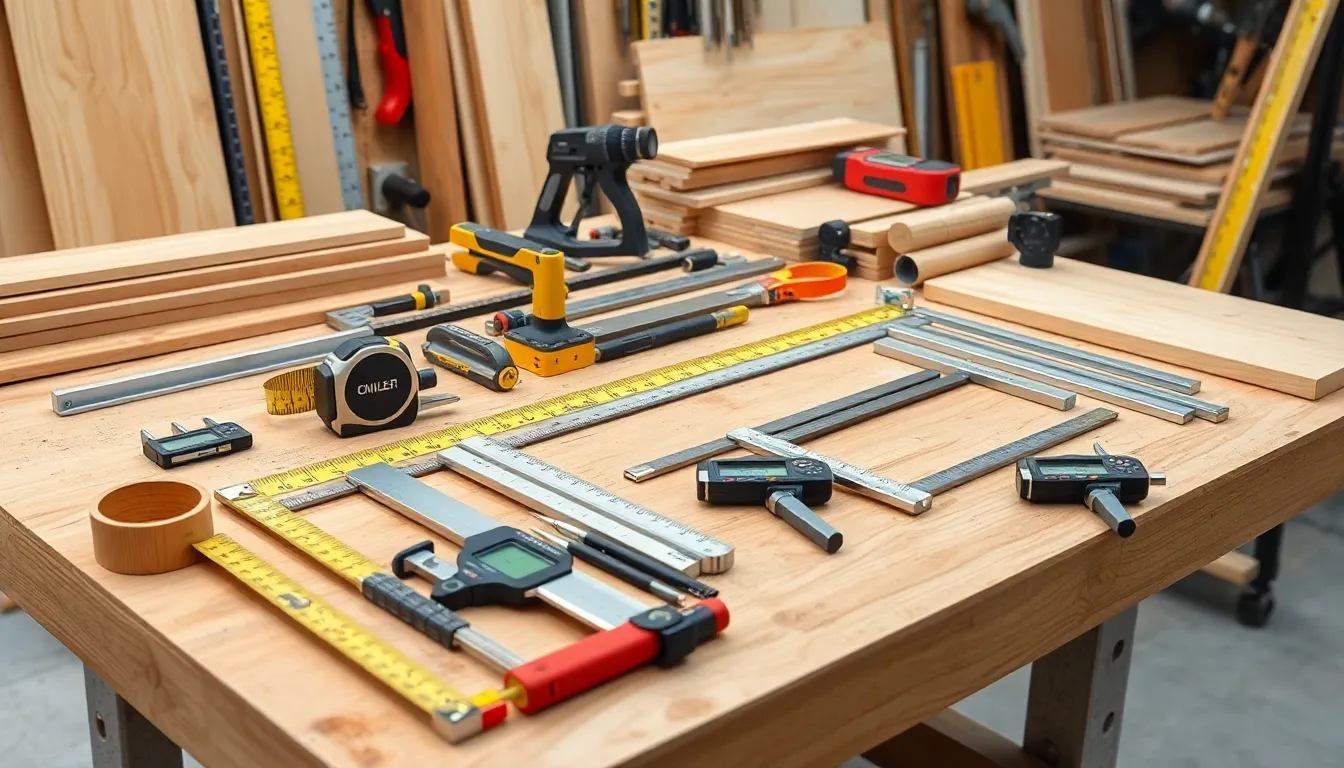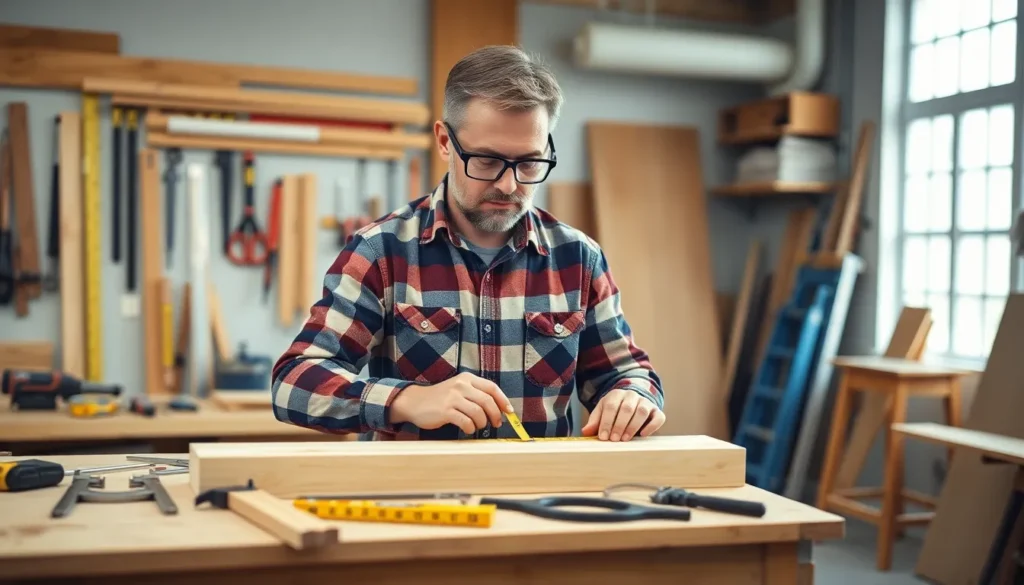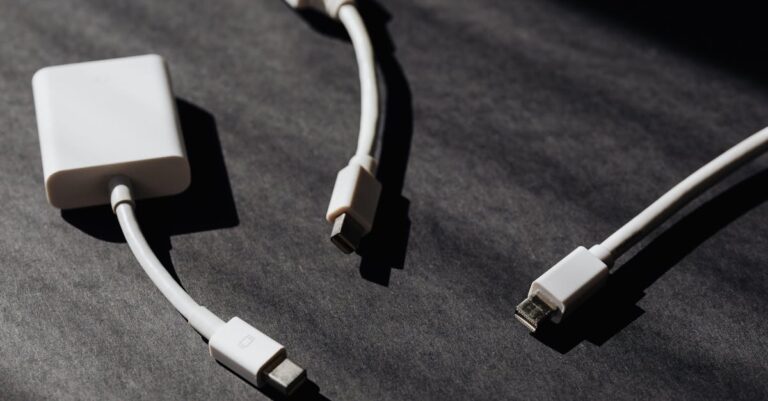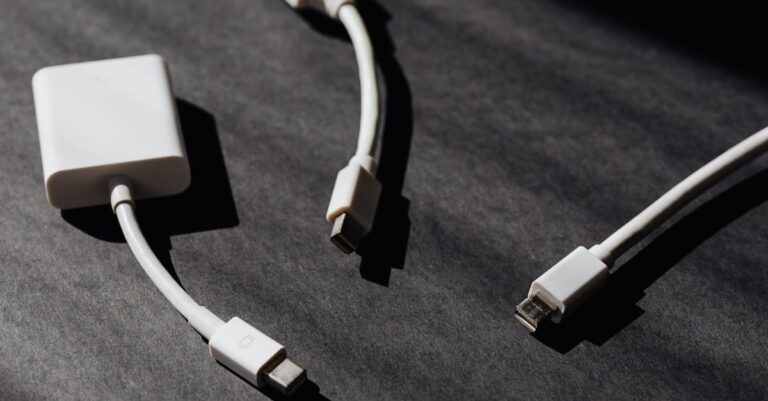Table of Contents
ToggleIn the bustling world of workshops, measuring tools are the unsung heroes. They help transform vague ideas into precise creations, ensuring that every cut, joint, and assembly fits just right. Without these trusty gadgets, a simple project could turn into a comedy of errors—think of a table with one leg shorter than the others, or a shelf that leans like it’s had one too many cups of coffee.
From tape measures to calipers, each tool plays a vital role in the symphony of craftsmanship. They’re not just about numbers; they’re about confidence. When wielded correctly, measuring tools can make even the most ambitious DIYer feel like a seasoned pro. So grab your favorite measuring device and get ready to dive into the world of accuracy—because in the workshop, precision isn’t just a goal; it’s the secret ingredient to turning chaos into creativity.
Overview of Measuring Tools
Measuring tools play a vital role in any workshop environment. Tape measures provide quick and efficient ways to gauge length and distances in various projects. Calipers offer precise measurements of internal and external dimensions, especially useful in metalworking and detailed woodworking tasks.
Rulers come in various styles and lengths, ensuring versatility for different layout requirements. Squares, such as framing squares and speed squares, help achieve right angles, a fundamental aspect of creating accurate designs. Levels are essential for ensuring surfaces are even, critical in installations and furniture construction.
Digital measuring tools have gained popularity due to their ease of use and accuracy. Laser distance measurers allow instant readings from a distance, eliminating the need for traditional tape measures in larger spaces. Moreover, micrometers provide high precision, often necessary in engineering applications.
Using these measuring tools improves the overall quality of work produced. For instance, employing a combination square enhances the accuracy of both angles and measurements, significantly reducing the likelihood of errors. Additionally, using measuring tools consistently can enhance efficiency and safety in a workshop setting.
Investing in this range of measuring tools supplies a reliable foundation for any project. Ensuring access to a variety of measuring devices helps tackle diverse tasks, permitting creativity and innovation. Each tool contributes uniquely to achieving professional results, reinforcing the craftsperson’s confidence in their work.
Types of Measuring Tools

Various measuring tools exist to enhance accuracy in workshops. Each type serves a unique purpose, ensuring precision in every project.
Handheld Measuring Tools
Handheld measuring tools are essential for quick and versatile measurements. Tape measures provide flexible length assessments, accommodating different surfaces easily. Rulers offer straight measurements, ideal for detailed work on drawings and layouts. Squares guarantee 90-degree angles, crucial for aligning materials accurately. Levels ensure surfaces are even, preventing issues during assembly. Calipers excel in measuring internal and external dimensions with high precision, particularly favored by woodworkers and metalworkers for intricate projects.
Digital Measuring Tools
Digital measuring tools are increasingly popular for their accuracy and ease of use. Laser distance measurers calculate long distances quickly, often through obstacles, streamlining measurement tasks. Digital calipers provide exact readings for small components, allowing for fast adjustments. Micrometers deliver precision measurements in millimeters, catering to those needing meticulous accuracy. Many digital tools feature displays that reduce the chance of human error. The integration of technology in measuring tools enhances efficiency and confidence in project execution.
Importance of Accurate Measurement
Accurate measurement significantly influences the quality of projects in a workshop. Precise dimensions ensure that components fit together seamlessly, reducing the likelihood of costly mistakes. Long-term success in woodworking or metalworking relies on reliability in measurements. Incorrect sizes can lead to structural failures, making accurate tools indispensable.
Tape measures support quick length checks, while calipers excel in providing fine measurements. Rulers and squares ensure right angles, forming the backbone of precise construction. Levels help maintain consistent surfaces, essential for aesthetic appeal and functionality. Each tool plays a vital role in delivering accurate results, impacting the final product’s integrity.
The rise of digital measuring tools showcases a shift toward enhanced accuracy. Laser distance measurers offer quick and error-free readings, while digital calipers present detailed measurements at the push of a button. Workshop efficiency improves with such technologies, allowing crafters to invest more time in creative aspects rather than corrections.
Accuracy in measurement also boosts a craftsman’s confidence. With precise tools in hand, individuals feel empowered to take on complex projects. Enhanced craftsmanship arises from reliable measurements, inspiring pride in one’s work. Success in achieving desired outcomes often traces back to meticulous measurement practices.
Ultimately, the role of accurate measurement cannot be overstated. It acts as a cornerstone in transforming ideas into reality. Quality projects emerge from a foundation built on precise measurements, leading to satisfaction and success in any workshop environment.
Tips for Choosing the Right Measuring Tools
Determine project requirements first. Understanding the types of measurements needed influences tool selection greatly. For example, tape measures serve well for long distances, while calipers excel in precise measurement of small components.
Evaluate tool accuracy next. Reliable measuring tools ensure that projects fit together seamlessly. Digital tools enhance accuracy further with features that minimize human error.
Consider the material being worked with. For woodworking projects, selecting a ruler or square ensures right angles and even surfaces. Metalworking may demand calipers or micrometers for precise internal or external dimensions.
Check for ease of use. Tools like laser distance measurers provide quick measurements and can streamline processes. User-friendly tools boost efficiency, enabling crafters to focus on creativity.
Observe tool versatility. Some tools perform multiple functions, which can be particularly beneficial for small workshops with limited space. Tape measures, for instance, serve various measuring needs, proving valuable in diverse tasks.
Think about the budget. Quality measuring tools often represent an investment that pays off over time. Price should match the expected durability and accuracy, preventing future costs related to mistakes.
Seek online reviews or recommendations. Trustworthy forums and experienced users share insights on the effectiveness and reliability of specific tools. Gathering this feedback assists in making informed decisions.
Prioritize brands known for quality. Established manufacturers frequently create reliable measuring tools, thus ensuring consistent performance. Brand recognition often indicates dependability, helping buyers choose wisely.
Maintaining Your Measuring Tools
Regular maintenance of measuring tools ensures their longevity and accuracy. Store tools in a clean, dry environment to prevent rust and damage. Calipers and precision instruments benefit from periodic calibration, keeping measurements reliable. Inspect tools for wear, particularly tape measures and rulers, which can experience bending or warping.
Cleaning measuring tools after each use is essential. Wipe down surfaces to remove dust, debris, or moisture that could affect precision. Specialized lubricants can help maintain sliding parts on calipers and locking mechanisms. Avoid storing tools exposed to extreme temperatures or humidity, as this can lead to material degradation.
Check battery levels on digital measuring tools regularly. Dead batteries can lead to inconsistencies, affecting project outcomes. Keep spare batteries on hand to prevent interruptions during critical measuring tasks.
Using protective cases or pouches can extend the life of measuring tools. These accessories guard against physical harm while transporting tools. When sharing tools, ensure they are returned in the same condition to maintain accuracy.
Avoid dropping or mishandling tools like levels or laser distance measurers. Just a small impact can cause misalignment, resulting in inaccurate measurements down the line. Prioritizing careful handling goes a long way in upholding tool integrity.
Lastly, familiarize oneself with the manufacturer’s maintenance recommendations. Following these guidelines optimizes tool performance and keeps measurements precise, leading to higher-quality projects.
Accurate measurement is fundamental to achieving success in any workshop. By investing in a variety of measuring tools, crafters can elevate their projects and ensure precision in every detail. From traditional tape measures to advanced digital options, each tool has its unique advantages that cater to different needs.
Proper maintenance and thoughtful selection of these tools can significantly enhance the quality of work while minimizing errors. With the right measuring instruments at hand, DIY enthusiasts can confidently bring their creative visions to life, knowing that precision is within reach. Embracing these tools not only improves craftsmanship but also fosters a deeper connection to the art of making.




